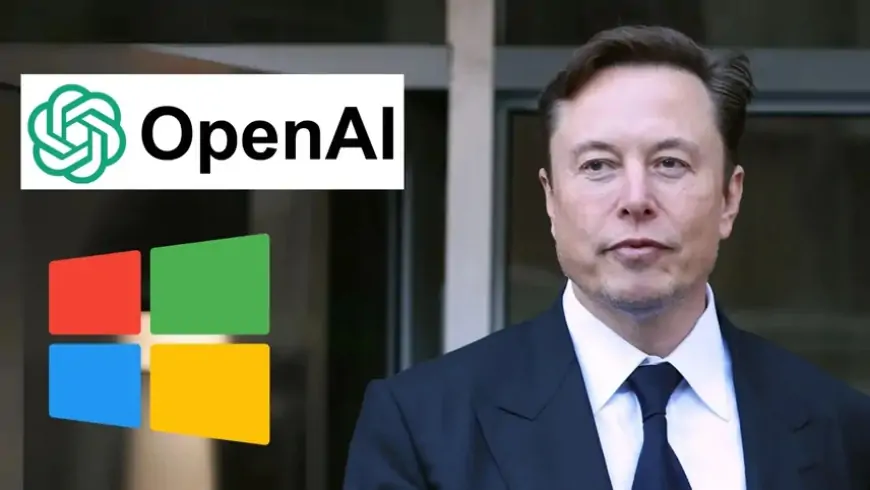Elon Musk reopens legal action against OpenAI
Elon Musk has revived his lawsuit against OpenAI, reigniting the legal battle over the company's practices and governance. Discover the latest updates.

Elon Musk has revived his lawsuit against OpenAI, which he had previously dropped. Musk alleges that OpenAI, along with founders Sam Altman and Greg Brockman, has strayed from its original mission of creating artificial general intelligence (AGI) for the benefit of humanity.
Key details
Musk's lawsuit accuses OpenAI of deviating from its founding principles by prioritizing commercial interests, particularly through its lucrative partnership with Microsoft. The lawsuit argues that OpenAI, established in 2015 to advance AI for humanity’s benefit, has shifted focus to profit-driven motives with its multibillion-dollar deal with Microsoft. Musk had filed a similar lawsuit earlier but withdrew it a few weeks ago without providing an explanation.
Context and background
OpenAI has evolved significantly since its inception in 2015. Here’s a timeline of key events related to the lawsuit:
2015: OpenAI was founded by Elon Musk, Sam Altman, Greg Brockman, and other researchers with the mission to develop AI that benefits humanity. Their goals included ensuring safe and transparent AI development, focusing on societal welfare, and sharing research openly.
2018: Elon Musk departed from OpenAI following a power struggle and withdrew his financial backing. Sources indicate that Musk wanted to shift OpenAI towards a commercial model, potentially partnering with Tesla and utilizing supercomputers. However, Altman and others opposed this direction, leading to Musk’s exit. OpenAI's blog post noted that Musk had agreed a for-profit structure was necessary but wanted either full control or a merger with Tesla.
2019: Following Musk’s exit and loss of financial support, OpenAI transitioned from a non-profit to a for-profit entity and secured a multibillion-dollar partnership with Microsoft to fund its operations and projects.
Detailed allegations
In his revived lawsuit, Elon Musk makes several specific claims against Sam Altman and Greg Brockman:
Misleading promises: Musk alleges that Altman and Brockman deceived him about their dedication to OpenAI’s founding principles, particularly their commitment to keeping AI technology open-source.
Shift in focus: Musk contends that the founders have deviated from their initial mission and now prioritize financial profits through their partnership with Microsoft.
Federal racketeering claims: The lawsuit accuses Altman and Brockman of conspiring to deceive Musk, intentionally misleading him about their plans and the direction of OpenAI.
Self-dealing and board takeover: As OpenAI’s technology neared transformative AGI, Musk claims that Altman established a complex network of for-profit affiliates, engaged in self-dealing, took over OpenAI’s board, and exploited the non-profit’s valuable technology and staff.
Responses and reactions
In response to Elon Musk's initial lawsuit, Sam Altman and other OpenAI leaders published a blog to clarify their stance. They reiterated their dedication to OpenAI's mission of developing AGI for the benefit of humanity but explained that achieving this goal required significantly more resources than initially anticipated. This need led them to transition to a for-profit model and partner with Microsoft.
The blog detailed that Musk had originally proposed a $1 billion funding commitment to OpenAI but withdrew the support when he could not secure control over the organization. This funding withdrawal highlighted OpenAI's need for billions of dollars annually to effectively pursue its mission, prompting the decision to form a for-profit entity.
OpenAI’s leaders also clarified that their mission did not entail open-sourcing every aspect of their technology. They referenced a discussion with Musk where he agreed that a more closed approach as they neared AGI development was reasonable.
Currently, OpenAI has not yet responded to Musk’s revived lawsuit. The delay might be a strategic move to prepare a thorough rebuttal or indicate ongoing internal deliberations on how to address this significant legal and ethical issue. Meanwhile, the AI community is closely monitoring the situation, awaiting OpenAI’s next steps.












































